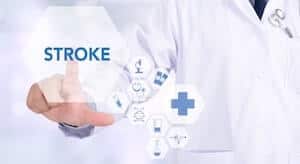How to Recognize the Signs of Stroke


What is a Stroke?
A stroke occurs when oxygen to the brain is suddenly cut off, and as a result, brain cells become oxygen-deprived and begin to die. A stroke can be caused by a blocked artery, known as ischemic stroke, or the leaking or bursting of a blood vessel, which is a hemorrhagic stroke. These “brain attacks” can happen at any time and to anyone, but the damage a stroke causes is determined by what area of the brain was affected.
The Centers for Disease Control and Prevention (CDC) report that almost 800,000 people each year suffer a stroke, and that stroke is not only one of the leading causes for serious long-term disability, but also the fifth leading cause of death in the U.S. Certain factors can increase your risk for stroke, such as having medical conditions like high blood pressure, cardiovascular disease or diabetes. Other risk factors include your age (those age 55 or older are more at risk) and your lifestyle; those who are sedentary, overweight or obese, or who drink or smoke also can be more likely to suffer a stroke.
The Signs of Stroke
For every minute that a stroke goes untreated, an individual will lose almost two million neurons while blood flow to the brain is being restricted. Someone who has suffered a small stroke — transient ischemic attack (TIA) or ministroke — may only suffer temporary problems such as weakness in the arms and legs. However, individuals who suffer a larger stroke can face issues like permanent paralysis on one side of the body or the loss of their ability to speak. This is why it’s vital to be able to recognize stroke symptoms quickly so medical treatment can be administered as soon as possible.
Some of the common signs of stroke include numbness or weakness in the face, arm or leg, especially on one side of the body. Or, trouble with communication and sight, dizziness, coordination or balance issues, and a sudden, severe headache.
The American Stroke Association recommends using the acronym F.A.S.T. to recognize some of the most sudden and common stroke symptoms. F.A.S.T. stands for:
F – Face drooping. Ask the individual to smile, and take note if one side of his or her face droops or appears uneven.
A – Arms. Have the individual raise both arms. Does one arm appear weak and drift down? Ask him or her if one arm feels numb.
S – Speech. Tell the individual to repeat an easy sentence, such as “The sky is blue” or “Mary had a little lamb.” Take note if his or her speech is slurred or if repeating the sentence seems too difficult.
T – Time to call 911. If any of the above stroke symptoms are displayed, call for help right away. Even if the symptoms appear to go away, it’s vital to get checked out. Also, make a note of the time the symptoms started, as the hospital staff will need that information. Remember, when it comes to a stroke, every minute counts. If you recognize any of these signs in yourself or a loved one, do not hesitate to seek medical treatment immediately.
On-Site Rehabilitation Services at Advent Christian Village
ACV offers both inpatient and outpatient rehabilitation services for stroke recovery and rehabilitation at Good Samaritan Center and Copeland Medical Center. The professional team is dedicated to making a positive difference in the lives of our patients by providing personalized care plans that meet each individual’s needs. Contact us to request more information.
Recent Posts
The Best Exercises for Seniors
No matter your age, exercising regularly offers countless benefits. Exercise is key to a healthy… Read More
Thoughtful Gift Ideas for Assisted Living Residents
Giving a gift to a loved one in an assisted living community can brighten up… Read More
Downsizing Tips for Seniors: Helping Mom and Dad Move
Downsizing for retirement can be a big task, and many families come together to help… Read More
Senior Living Options: Homes and Apartments
Retirement isn’t one-size-fits-all, and neither are senior living options. Whether you buy or rent, want a… Read More
Tips for an Easier Transition into Assisted Living
If you’ve started to notice a decline in the mental or physical health of a… Read More
Retiring to Rural Area Communities: What You Need to Know
Many seniors heading into retirement are looking for a new, more relaxed way of life.… Read More


